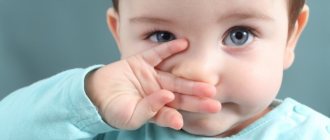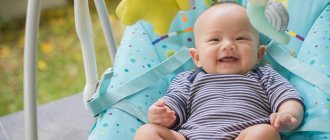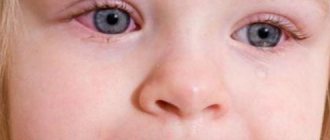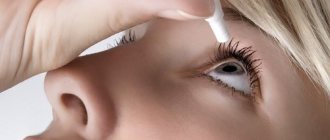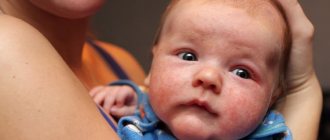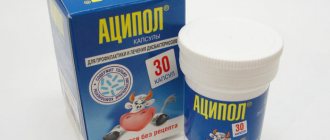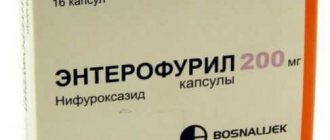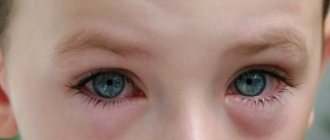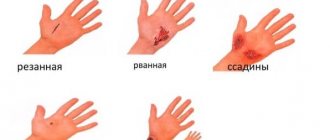Brief description of the drug Derinat
Derinat nasal drops are a domestically produced medicine produced by Technomedservice. Children can be treated with Derinat alone or combined with other medications .
The bottle's shelf life is 5 years, after opening 2 weeks. The drug is stored in a dark place, at a temperature from +4 to +20 degrees. It is better to put the open container in the refrigerator. Derinat is available in pharmacies without a prescription.
Instructions for use of Derinat
Derinat's instructions do not have clear dosages according to age. The absence of toxic substances makes it possible to treat children from 12 months, prescription up to a year individually. This is decided by the neonatologist, based on the diagnosis, health status, and reaction of the child. You need to use the drug correctly, for this:
- The nose is cleaned. You can liquefy mucus with Aquamaris, Humer and others. After 10 minutes, the child should blow his nose; in babies, the nasal passages are cleaned with an aspirator.
- The patient is placed on his side and Derinat is instilled into the upper nostril, then turned over and the manipulations are repeated on the other side.
- If storage is carried out in the refrigerator, the bottle must first be warmed to room temperature in a fist.
In practice, a volume equal to 10 ml is consumed in less than 14 days, so it will not have time to deteriorate.
Therapy methods
The occurrence of rhinitis in babies in the first 3 months of life does not always indicate the development of a respiratory disease. At this age, the mucous membranes of the ENT organs are not yet able to fully perform their functions. In particular, the work of the nasopharynx is poorly regulated, so nasal secretions in the nasal cavity can be produced in large volumes for no apparent reason.
It should be understood that in children under 6 months of age, the airways are still too narrow, so nasal secretions can stagnate in them and interfere with normal breathing. Simple physiotherapeutic procedures aimed at removing mucous secretions from the nasopharynx will help eliminate nasal congestion.
Medications
Before treating nasal congestion in an infant, you need to accurately determine the cause of the obstruction of the nasal passages. Infectious inflammation is eliminated by taking antibiotics and antivirals. If the nasopharyngeal obstruction was caused by allergies, your pediatrician will recommend safe antihistamines and nasal barrier products.
You cannot give your child regular pharmaceutical medicines for colds. This is especially true for antibiotics and vasoconstrictor drops (decongestants). They contain too many active ingredients that can cause an allergic reaction in a newborn. As a rule, treatment of nasal congestion in infants involves the use of gentle nasal preparations based on isotonic solutions, as well as immunostimulants and 4th generation antihistamines.
Physiotherapeutic activities
What to do if the baby does not breathe through his nose? Nasal congestion is most often a consequence of overactivity of single-celled mucus-producing glands. Due to the narrowness of the airways, nasal secretions clog the internal nostrils (choanae), through which air penetrates directly into the laryngopharynx. To restore normal patency of the respiratory tract, it is recommended to periodically remove accumulated secretions from the nasal cavity.
If the child is 3 months old, he will not be able to blow out the mucus on his own. To remove fluid from the nasal passages, it is recommended to use nozzle ejectors (aspirators). For the most effective suction of mucus, doctors advise using electronic devices. They are equipped with fairly powerful compressors that allow you to remove nasal secretions in literally a matter of seconds.
Dosage
The amount of the drug used will vary depending on the disease. Treatment of a runny nose is carried out with 2-3 drops, which are instilled into each nostril 3-4 times a day, for three days.
In the absence of relief, you should definitely visit a doctor to prescribe additional medication or replace it. Otherwise, a chronic form may occur or complications may begin in the form of otitis media, sinusitis, and other things.
Drops have an immunomodulatory effect for colds and flu. For treatment, 2-3 drops are prescribed every 1.5 hours throughout the day. On the second day, the interval is 3-4 times a day, the dosage is the same. Therapy can last a month. Acute inflammations such as sinusitis and sinusitis are treated with 3-5 drops, 6 times a day, from 1 to 2 weeks.
Nebulizer or inhaler: which is better for treating colds?
Gargling is carried out 4 to 6 times a day. One bottle is enough for 2-3 procedures, they need to be carried out over 5-10 days. For the treatment of inflammatory processes in the eyes, the drug is used in 2 drops for 14-45 days. To prevent influenza and other respiratory diseases, use 2 drops, 3-4 times a day. The use of the drug continues throughout the epidemic period, the course is 1-2 weeks, after rest it can be repeated.
Preparing the nasal cavity for treatment
The effectiveness of rhinitis therapy increases if you first prepare your nose for the effects of drops. To do this, you need to clean the child’s nose and do this better after instilling a saline solution or drugs such as Aquamaris or Salin. Such products soften thick mucus, promote its removal and, therefore, increase the susceptibility of the mucous layer to subsequently administered medications.
When using nasal drops, it is necessary to know the technique of instilling them in a baby. After freeing the nasal passages from accumulated mucus, the child should be placed horizontally so that his head leans back slightly. The easiest way for parents to do this is on the changing table or by placing a pillow under the baby’s body. The head should also be turned to the side, first instilled into the lower nostril, change the position of the head and instill into the other nasal passage.
Interaction
In addition to Derinat, depending on the symptoms, the doctor prescribes medications for fever, antibacterial, against fungus or virus, for cough and sore throat, and others. It is prohibited to combine medications on your own.
As a result of treatment with several drugs, it is possible to increase the effect of one and decrease the effect of another. This can be both good and bad. For example, a combination with anticoagulants can cause poisoning due to the increased influence of the latter, and if you use it with antibiotics, then their duration of use and dosage can be reduced. When using Derinat topically, do not combine hydrogen peroxide and fatty ointments with it.
Thermal procedures (inhalations, steaming feet, baths)
Thermal procedures are often used for home treatment of a runny nose, and for any colds.
But warming your feet (steaming your feet) in a bath can only lead to even greater dilation of blood vessels and worsening of a runny nose. In addition, some people use very hot water, which can cause burns. The same applies to the favorite folk remedy - mustard plasters, which make sense only as a way to make a child lie quietly for a while, but are useless in a medical sense.
Inhalations can be given to children if they have been recommended by a doctor. However, as such, inhaling steam or oils is not only useless, but can burn the sensitive mucous membrane of the little nose.
Be healthy you and your children!
Side effects
The drug does not have any pronounced side effects; they can be caused by improper use of the medication. Burning and itching may occur on the nasal mucosa during the treatment of acute respiratory viral infections and acute respiratory infections. In patients diagnosed with diabetes mellitus, a hypoglycemic effect is noted, which requires consideration when measuring blood sugar levels.
Indications Derinat
Derinat is produced not only in drops; in pharmacies you can find it in the form of a throat spray, a solution for intramuscular administration and external treatment. The drug is effective for diseases caused by decreased immunity. It is indicated in therapy:
- sinusitis, sinusitis, tonsillitis, laryngitis, pharyngitis, tonsillitis;
- otitis;
- gynecological diseases;
- pathologies of the lungs and bronchi;
- ARVI, acute respiratory infections, influenza;
- allergies;
- radiation injuries;
- bacterial and fungal infections;
- wounds and ulcerative skin lesions;
- frostbite;
- hemorrhoids;
- thermal and chemical burns;
- gastrointestinal diseases;
- ophthalmological pathologies and other things.
Nasal aspirator Otrivin Baby: instructions for use
Despite the large list of indications, Derinat is most often used in pediatrics for the treatment of ENT diseases and their prevention.
The healing properties of drops
It is immediately worth noting that it is possible and even necessary to use Derinat for the prevention of ARVI in children, since this drug was developed specifically for this purpose. It exerts its therapeutic effect in several directions at once. They are:
- Pronounced cardioprotective effect.
- Rapid restoration of the affected nasal mucosa.
- Activation of the body's defenses and strengthening of the immune system, thanks to which adults and children can quickly overcome the activity of pathogenic bacteria and viruses.
- Protection against the development of unwanted complications after a cold, which can occur in the form of sinusitis, sinusitis, otitis media and inflammation of the sinuses.
It should be noted that Derinat for influenza in children can be used in both forms of release: nasal spray and nasal drops.
Both of these types of medicine are equally effective and easy to use. Moreover, both spray and drops contain the same active substance, so the difference between them lies solely in the features of use.
Use during pregnancy and breastfeeding
As for pregnancy, experts do not take responsibility to deny the effect of Derinat on the fetus, despite its safety, since no one has conducted such studies.
In this regard, the medication is not officially approved during pregnancy. According to the instructions, this category of women, including breastfeeding women, can be treated with medication only according to the indications of a doctor who has assessed the risks and benefits of therapy.
Sprays for children from 1 year
A runny nose is just one of the manifestations of an infectious or allergic disease. Nasal obstruction (swelling of the nasal cavity) occurs due to acute or chronic inflammation of the tissues inside the nasopharynx and paranasal sinuses. For this reason, the internal diameter of the air channels narrows, which leads to difficulty breathing.
To treat rhinitis in children, medications with minimal concentrations of active ingredients are used. The fact is that the child’s body is susceptible to sensitization due to the unstable functioning of the immune system. An overdose of medications often leads to the appearance of allergic edema and, accordingly, a deterioration in the patient’s well-being. To avoid complications, vasoconstrictor, homeopathic and moisturizing aerosols are used in pediatrics to treat children over one year of age.
Saline based products
Moisturizing sprays are universal preparations that are used to rinse the nasal cavity and thin the mucus in it. The aerosols contain sterilized sea water, extracts from medicinal plants (sage, rose hips, sea buckthorn, chamomile) and beneficial microelements. Children's sprays for the common cold have virtually no contraindications, so they can be used to treat rhinitis of any origin. Some of the safest sprays include:
- "Aqua Maris";
- "Marimer";
- "Salin";
- "Quicks Kids";
- "Aqualor Baby"
The use of hypertonic solutions (salt concentration greater than 0.9%) when treating children under 2 years of age is not recommended, as they lead to dehydration of the mucous membrane.
If a child has difficulty breathing due to stagnation of mucus in the nasal passages or the formation of crusts in them, rinsing with saline aerosols will help ease breathing. They not only relieve inflammation and swelling, but also dilute nasal secretions, which facilitates its evacuation from the airways. To achieve the necessary therapeutic effect, sanitation of the nasopharynx must be performed at least 4-5 times a day.
Homeopathic remedies
The therapeutic effect of homeopathic remedies has not been proven scientifically. In this regard, the effectiveness of homeopathy is equated to the effectiveness of placebo. The aerosols contain extracts of medicinal herbs and negligible concentrations of infectious agents. This allows the body to develop antibodies to them and thereby cope with the disease.
To treat a child, it is advisable to use gentle homeopathic preparations with an immunostimulating effect:
- "Delufen";
- "Euphorbium";
- "Aflubin-Naze";
- "Rinitol."
A good spray does not contain preservatives or synthetic substances that can cause an unwanted reaction. It should be remembered that homeopathic remedies do not have a vasoconstrictor effect, so they do not bring immediate relief.
Vasoconstrictors
Vasoconstrictor aerosols (anticongestants) are used both for allergic rhinitis or hay fever, and for colds. The medications contain adrenaline receptor stimulants (phenylephrine, xylometazoline, naphazoline), which help narrow the blood capillaries in the nasopharynx. Due to the outflow of blood and intercellular fluid from the tissues, swelling in the mucous membrane decreases, resulting in easier breathing through the nose.
Anticongestants contain a minimal concentration of vasoconstrictor substances, since their excess often leads to undesirable systemic effects - tachycardia, nausea, diarrhea, abdominal pain, etc. In pediatric practice, to relieve signs of rhinorrhea (acute rhinitis) and congestion, the following is used:
- "Otrivin Baby";
- "Vibrocil";
- "Oxymetazoline 0.01%";
- "Nazol Baby";
- "Tizin Xylo."
Adrenaline receptors are located not only in the nasal cavity, but also in the bronchi and myocardium, so an overdose of anticongestants often leads to side effects.
It should be remembered that anticongestants have one very important feature: if stimulants of adrenaline receptors constantly circulate in the bloodstream, the vessels stop responding to them. To achieve the required therapeutic effect, it is necessary to increase the dosage of drugs. But if you use vasoconstrictor aerosols for 7 days or more, this will lead to the development of local vascular dystonia and, as a consequence, drug runny nose.
Use in children
The safety and effectiveness of Derinat for children has been proven by numerous scientific studies, and therefore it is widely used in pediatrics. Despite this, you cannot self-medicate; a doctor must prescribe the drug and determine its dosage. For children, in addition to ENT diseases, Derinat can be prescribed for:
- pneumonia;
- obstructive bronchitis;
- urinary tract diseases;
- diseases of the gastrointestinal tract, central nervous system, heart;
- arthritis.
In case of inflammation of the upper respiratory tract, adenoiditis, hay fever, tonsillitis, inhalations are carried out with Derinat solution, in a ratio of 1:4 with saline solution. The duration of the procedure is up to 7 minutes, twice a day. Inhalations are carried out for 5-10 days.
What else can the product be used for?
Derinat is rightfully considered a universal remedy. For convenience, different release forms allow it to be used for different diseases and in different ways.
Derinat is applicable in the following cases:
- inhalations for diseases of the lungs and bronchi;
- rinses or applications for pathologies of the oral mucosa or gums;
- injections for severe infections or oncology;
- compresses for infected or long-healing wounds;
- for ophthalmological problems (eye diseases);
- in gynecology, etc.
Carrying out inhalations
Inhalations are effective for diseases of the upper respiratory tract, lungs and bronchi, bronchial asthma and allergies. Many mothers resort to inhalation for long-lasting runny nose and severely blocked nasal passages, cough, tonsillitis, adenoids, etc.
It is worth mentioning that Derinat can only be used in a nebulizer (inhalation device). The instructions for use do not indicate this method of using the solution. However, doctors and patients note its high effectiveness. The nebulizer sprays the substance in the form of an aerosol. When inhaled through a mask, small particles are able to penetrate into the most inaccessible places, which cannot be said about droplets. As a result, the therapeutic effect occurs faster.
For inhalation you will need a solution in 10 ml ampoules. Derinat must be diluted with saline in a ratio of 1:4 (1 part of the drug to 4 parts of saline). The apparatus flask must be filled to the maximum level.
The duration of each procedure is at least 5 minutes (or until all the liquid from the flask has evaporated). Inhalations should be done 2 times a day - in the morning and in the evening before bedtime. The course of treatment lasts 10 days and can be adjusted by the attending physician.
Treatment of eye diseases
Derinat is often prescribed for ophthalmological diseases and purulent-inflammatory processes in the eyes. It can be used as an independent or auxiliary means of therapy.
Thanks to its antiseptic, antibacterial, antiviral and antifungal properties, the drug has occupied an important place in ophthalmology. Additional qualities include its ability to quickly heal and regenerate body tissue.
For children with conjunctivitis or purulent-inflammatory processes, 1-2 drops are instilled into the conjunctival sac in each eye up to 4 times a day. Treatment takes no more than 10 days. In dystrophic processes, the course of therapy can last up to 1 month.
Mouth rinses
Inflammatory processes of the mucous membrane in a child’s mouth are a common occurrence. Stomatitis, thrush, various ulcers or erosions appear in every baby.
Derinat effectively fights pathogenic microflora without affecting the mouth's own internal microflora. This is a fairly mild remedy for the mucous membranes, which promotes healing and restoration of the affected areas.
Before using the medicine, you need to clear your mouth of any remaining food. The procedure is carried out between meals; after rinsing, it is not recommended to eat or drink for 30–60 minutes.
Rinse your mouth thoroughly for several minutes. One bottle is designed for 2 rinses. 4–6 procedures are indicated per day. The course of treatment lasts no more than 10 days.
Depending on the patient's age and diagnosis, the pediatrician or dentist can adjust the treatment plan. Sometimes the drug is diluted. For young children, wipe their mouth with gauze or bandage soaked in the preparation.
special instructions
Derinat can be classified as a universal group of drugs, with the absence of allergy-causing substances that do not affect the functioning of the organs and systems of children and do not provoke cell mutation.
The solution is transparent in color, has no distinct odor, and is considered multifunctional, as it has an effect not only for diseases of the ENT organs. In the presence of gangrene, the drug promotes spontaneous rejection of the necrotic mass and healing of the skin. People with open wounds and burns note its pain-relieving effect.
Derinat - what kind of medicine is this?
Before you take these drops for a runny nose, it’s worth understanding: Derinat - what kind of medicine it is, and what it helps with. Absorbed into the mucous membrane, the drug enters the blood and tissues, fights nasal congestion well, and removes snot. This is a strong immunomodulator, which contains only natural ingredients.
More Derinat drops are prescribed for diseases of the eyes and oral cavity. The main substance - sodium dioxyribonucleate - binds free radicals formed during inflammation, its antioxidant effect protects against the influence of toxins, stimulates the formation of blood cells. At the same time, the doctor can prescribe pills that stop inflammation and relieve swelling.
The drug in combination with other drugs is prescribed for:
- ulcers, wounds, gangrene;
- frostbite, burns;
- necrosis after irradiation;
- hemorrhoids;
- ischemia;
- obstruction in the lungs;
- rheumatoid arthritis.
Derinat drops – composition
The drug Derinat is developed in the form of drops, sprays and solutions for injections, the first are good prevention of influenza, they are prescribed for colds and exacerbation of respiratory tract diseases. It is a clear, odorless liquid based on sodium dioxyribonucleate, a substance obtained from the milt of sturgeon and salmon fish.
Full composition:
- sodium disoxyribonucleate;
- sodium chloride;
- water for injections.
Derinat – mechanism of action
How Derinat works - it restores damaged tissue, and not only the mucous membrane. It often happens that when an illness occurs, a weakened immune system allows other infections to pass through, which can lead to exacerbations and complications. The drug helps prevent this by increasing the cells’ ability to defend themselves.
The main role is played by sodium dioxyribonucleate, as a strong immunomodulator; it activates white blood cells, called T-hellers, and B-lymphocytes, which form the immune defense. It also activates macrophages capable of digesting toxins and bacteria.
Researchers note the 3 strongest effects:
- antibacterial;
- antiviral;
- antifungal.
How Derinat drops work:
- stimulate the body to fight bacteria and viruses;
- restore the nasal mucosa;
- improve the functioning of the respiratory system;
- relieve swelling and reduce inflammation.
Derinat's analogs
The drug Derinat is quite effective, which justifies its cost, which varies about 230-310 rubles for drops, 340-430 rubles for a spray, 350-400 rubles for an external solution, ampoules for injections cost about 2000 rubles for 5 pieces.
Imudon: purpose, dosage, contraindications
This price does not suit all parents; perhaps the drug is not available in the pharmacy during treatment, which forces them to look for analogues. There are many substitutes, they are chosen taking into account what exactly Derinat is treating.
Table 1. Analogues of the drug Derinat.
| Analogue name | Price |
| Deoxynate (amp.) | From 280 rub. for 10 ml |
| Kagocel (table) | From 260 rub. |
| Arbidol (table) | From 230 rub. |
| Ingavirin 90 mg (caps.) | From 510 rub. |
| Grippferon (nasal drops) 10000 IU/ml, 10 ml | From 250 rub. |
| Nazoferon (spray) | From 280 rub. |
| IRS-19 (nasal spray) 20 ml | From 500 rub. |
| Poludan (nasal drops) 100 units, bottle 1 pc. | From 620 rub. |
| Sinupret (drops) | From 380 rub. for 100 ml |
| Aquamaris (drops) | From 115 rub. |
| Vibrocil (drops) | From 350 rub. for 15 ml |
When can Derinat be used to treat infants?
In most cases, Derinat in pediatric practice is prescribed to newborns for runny nose and respiratory infections. When choosing medications for children, the pediatrician is primarily guided by their effectiveness and safety. Derinat meets these requirements. Its administration to infants is also explained by good treatment results.
The positive effect of using this medicine is associated not only with its effect on human pathogenic microorganisms, but also with an increase in local immunity, which reduces the risk of developing respiratory diseases in the future.
The instructions for use explain that Derinat drops, after being instilled into the nose, immediately activate three types of immunity in children, that is, the antiviral, antifungal and antibacterial defenses of the body are enhanced.
Prescribing medication for a runny nose in infants allows you to achieve several treatment goals at once:
- activation of local immunity allows you to quickly neutralize the pathogenic effect of bacteria, viruses or fungi that have entered the nose;
- manifestations of rhinitis are reduced, that is, swelling is reduced, and less mucus is produced: all this facilitates the child’s general well-being;
- the mucous membrane of the nasal passages is restored and its strength increases.
- the reparative property of Derinat reduces the possibility of germs entering the nose in the future, that is, the medicine is also suitable for the prevention of possible respiratory infections and seasonal flu;
- will prevent the development of complications with a runny nose.
Derinat drops can be used to treat children starting from their birth. This medicine is also available as a spray, but the use of this dosage form is recommended only for children after three years of age. The spray can also be used to treat throat diseases, but in this case the drug must be prescribed by a doctor. Reviews about the treatment of children from parents can be read on various resources and in most cases they note the positive aspects of this medicine.
Derinat drops are not drugs with a vasoconstrictor effect and therefore are not addictive and do not dry out the mucous membrane. Therefore, unlike vasoconstrictor drugs, the use of this medication can be continued for months if necessary.
Derinat drops are prescribed to children of the first year of life and older with the development of rhinitis of infectious etiology. You can use drops at any stage of the disease, but it is better to do it earlier, as there is a greater chance of a quick recovery. But it is necessary to understand that the use of any medicines must always be justified. Parents should always remember that in newborns, a runny nose is often physiological and no medications are needed to eliminate it.
Reviews from doctors about Derinat
Pediatrician, 7 years of experience, Kolpakova E.V.
“I often prescribe the domestic immunomodulator Derinat to children of all ages. The good news is that it can be used by babies up to one year old. Over many years of practice, many mothers whose children I treated noted the effectiveness of the drug for acute respiratory infections and acute respiratory viral infections. There are parents who are not very happy with the cost, so I try to prescribe an analogue cheaper for them. Unfortunately, substitutes do not always show similar effectiveness and have more contraindications and side effects.”
Pediatrician, 4 years of experience, Voronin A. B.
“Derinat has proven itself well in the treatment of rhinitis of various etiologies. In most cases, improvement occurs within the first few days. I did not observe any side effects, however, the drug should be prescribed exclusively by a doctor, especially for young patients. One of the downsides is the high price."
Pediatrician, 1 year of experience, Svetlova O. V.
“I have little experience in treating children. In the treatment of many ENT diseases and their prevention during epidemics, my colleague often prescribed Derinat. Mothers treated the medication well because of its safety, the possibility of use from birth and the absence of side effects. The instructions describe it as a multifunctional drug used against viruses, fungi and bacteria, which allows it to be prescribed for many diseases.”
Doctors are still arguing about drugs that activate their own immune cells. Some believe that such an intervention can harm the body, others say that the recovery of patients in most cases occurs due to self-hypnosis. Still others note the high effectiveness of Derinat.
Features of a runny nose in early childhood
In young children, a specific type of rhinitis occurs, the so-called physiological runny nose. This is due to the structural features of the nasal cavity in newborns.
The goblet cells that produce mucus are just getting used to working in a new mode, so they produce secretions in large quantities. The baby's narrow nasal passages become clogged with this mucus.
The snot is liquid, transparent and outwardly this picture resembles a runny nose, but with one difference. Apart from snot in the nose, nothing bothers the child. He is cheerful, sleeps well, eats normally, and his temperature is within normal limits.
With a viral or bacterial runny nose in an infant, the picture of the disease changes dramatically. A feature of rhinitis in children under one year of age is the predominance of general symptoms over local ones.
An immature immune system immediately triggers a general inflammatory reaction, and a common runny nose causes a high fever, cough, weakness, lack of appetite, vomiting, diarrhea, moodiness and other symptoms that frighten parents.
An inexperienced mother may not immediately understand that the cause of this condition was ordinary snot, and not some serious illness unknown to science.
What types of runny nose can bother a newborn:
- Viral. Develops when it encounters viruses during ARVI. Accompanied by severe swelling of the nose, high fever, mucous discharge from the nose and other symptoms.
- Bacterial. As a rule, it is accompanied by purulent discharge from the nose, as well as symptoms of general intoxication: fever, fever, sweating, refusal to eat, etc.
- Allergic. Transparent, abundant, watery discharge from the nose, lacrimation, redness of the skin.
- Mixed. A combination of bacterial-viral or bacterial-fungal infection. It is observed in cases of reduced immunity or congenital immunodeficiencies.
